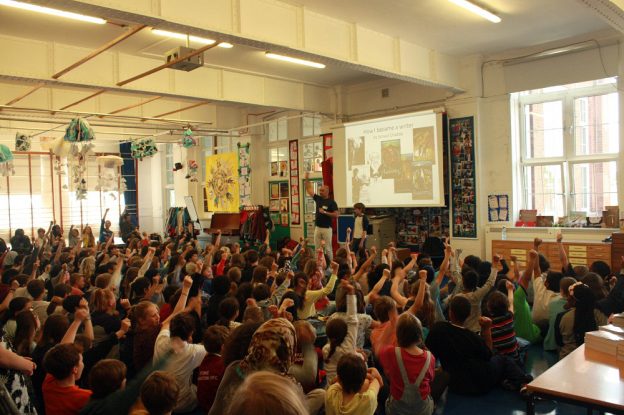Address:
William Patten Primary School
Stoke Newington Church Street
London N16 0NX
Office Manager: Rita Quigley
SENDCo: Caitlin Shaw
William Patten Primary School
Stoke Newington Church Street
London N16 0NX
Office Manager: Rita Quigley
SENDCo: Caitlin Shaw

This brings with it many advantages:
Our size brings benefits, but we also believe that young children generally flourish in small defined communities, where every staff member can quickly respond to children’s needs. We have arranged the school into manageable stages, thus offering children a gradual progression to greater independence and responsibility.
The Nursery and Reception classes form the Early Years Foundation Stage (EYFS). The Nursery is self-contained with its own outdoor play area, toilets and entrance. From their secure base children find visits to the rest of the school exciting. Children are carefully prepared during the summer term for the move from Nursery to Reception by attending assemblies, taking part in workshops, visiting their new classrooms and generally becoming more integrated into main school activities. This preparation for transition from Nursery to Reception is planned for all children, irrespective of whether children will attend William Patten or move onto another setting.
Reception classrooms have their own entrance and outdoor play area, which is separated from the main school entrance. This provides a calmer and safer point of contact, for these younger children and their families. Once settled, Reception children attend whole school events such as assemblies, celebrations, workshops etc. Reception children eat their lunch in the school dining hall and afterwards they play in the Key Stage 1 playground.
During the summer term, Reception children are carefully prepared for their transition to Year 1. The morning becomes more structured, reflecting the increased independence needed for Year 1; children are given more opportunities to complete work without adult support, are taught music in the music room, attend all whole school assemblies and visit Year 1 classrooms to meet their new teacher.
At the end of Reception, prior to starting Year 1, classes are carefully mixed to achieve a balance of ability, age, gender, culture, friendship groups, home language, special needs and confidence.
Key Stage 1 (KS1) consists of two years – Year 1 and Year 2. In Year 2 (aged 6-7) children move from the ground floor to the first floor (middle floor), gaining more independence and responsibility, in preparation for their transition to Key Stage 2.
Key Stage 2 (KS2) covers Year 3 to Year 6 (ages 7–11). Year 3 classrooms are on the middle floor of the school and Year 4 to Year 6 classrooms are on the top floor. Children now work more independently and play a part in running the school community – for example, children in Year 5 and Year 6 can become Peer Supporters, where they play with and help Reception and KS1 children during lunchtime play. Older children have lunchtime access to the KS2 library.
Assembly is an opportunity to all meet together as a Key Stage or as a whole school.